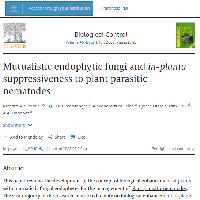Resumen
- This paper reviews the development of the concept of biological enhancement of plants with mutualistic fungal endophytes for the management of plant parasitic nematodes. The vast majority of the research conducted to date on biological enhancement of plants with fungal endophytes involves the use of nonpathogenic strains of Fusarium oxysporum and, to a lesser extent, species of Trichoderma, for biological control of nematodes. The main crops thus far studied for biological enhancement with endophytes have been banana, tomato and rice. Because the concept of using nonpathogenic fungi that colonize the endorhiza for biological control is still relatively new, information on this subject in the form of published literature is scare, in the form of Ph.D. theses or in unpublished form. Taking this limitation into account, it is nevertheless hoped that this review will be useful to those working or planning to work with mutualistic fungal endophytes for biological enhancement of plants for nematode management.
